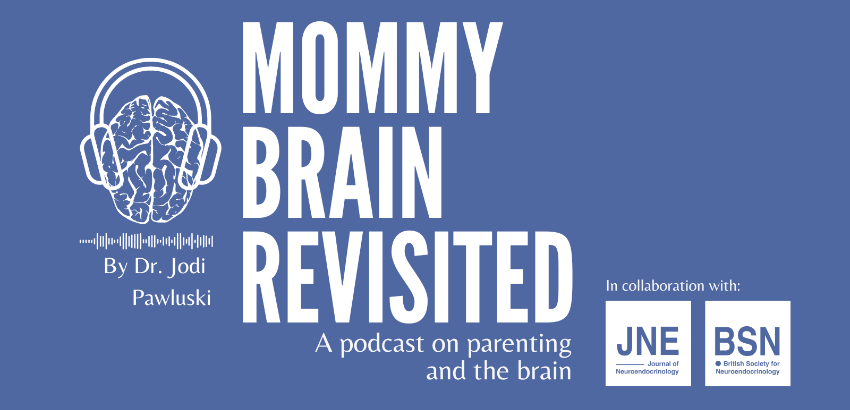
Coming soon - Parental brain research podcast series
Over the coming year, Journal of Neuroendocrinology has partnered with the Mommy Brain Revisited podcast, created and hosted by Dr Jodi Pawluski, to share research from papers in the upcoming Parental Brain Special Issue. Papers in the Special Issue will be submitted by attendees to the Parental Brain Conference 2025 held in Barcelona, Spain.
In this blog interview, Dr Jodi Pawluski shares what to expect and why podcasts are so great for sharing valuable research:
Tell us about the JNE and Mommy Brain Revisited podcast collaboration
I'm really excited about the opportunity to have this collaboration between Mommy Brain Revisited, which is a podcast I started a few years ago and a special issue I'm co-editing for the Journal of Neuroendocrinology on the parental brain and it's based on papers submitted by attendees to the Parental Brain conference that happened in May in Barcelona. I'm really excited to have this collaboration to share the science in podcast form.
Why did you start Mommy Brain Revisited?
I started Mommy Brain Revisited in 2020 as I realised there was a lot of podcasting going on and over the past few years I had been asked more about how the brain changes with parenthood. Having the podcast was an opportunity for me to host other neuroscientists and researchers and have them talk about their research on the parental brain and perinatal mental health so that the public could see who's doing what types of research, the diversity in the research, but also the importance of it.
We often see quotes in a newspaper article, but we don’t get to hear the expert talking about their research, and I think it’s valuable to have that opportunity. It's been an honour for me to be able to speak with so many experts in the field about their research, but also an honour to be able to share this with everybody out there who's listening.
Why is research into the parental brain important?
There are huge rates of mental illness in the postpartum period and in pregnancy that aren't necessary. We need to prevent this. There’s been more and more talk about that as it’s this important transition for those of us who become parents that impacts our brain as well as our behavior.
What has the response to the podcast been?
I now have listeners in 96 different countries and I've had nearly 30,000 listens which for this niche market which shows this is an interest to many people. I also have a broad audience of not only parents but also healthcare professionals who work with parents, students and other academics. I know people use it their classes when they teach too.
Which episode has been the most popular?
The very first episode I did with Joe Longstein on Anxiety and motherhood has done well, not just because it's been up the longest, but because it's an interesting topic to discuss and to understand as it impacts so many parents. Most people will feel an uptick in anxiety when they become parents and for some it can be to clinical levels so this podcast episode has probably been the most popular.
What can we expect from the Journal of Neuroendocrinology Parental Brain Special Issue due out in 2026?
This is the third time I’ll be guest editing a special issue on the parental brain at Journal of Neuroendocrinology and I'm looking forward to what this is issue will hold. Typically, you'll see original articles as well as review papers. We have papers that are neuroendocrinology focused and then we have broader papers that look at other aspects of parenting, physiology, parental brain changes, mental health in various animal models.
At the 2025 Parental Brain conference we had some great speakers on parenting and frogs, for example, or California mice so we will likely see some papers on that. And then also work done in humans looking at imaging and biomarkers related to neuroplasticity and then how that might relate to behaviour in mothers and fathers. I'm hoping to see a broad range of papers with research exploring different animal models and humans looking at different aspects of the neuroscience of parenting.
How will the podcast series link with the special issue?
We're just at the beginning stages of the podcast. I would like to give everyone the opportunity to speak on the podcast. I think it's a great opportunity even to share 15-minute summary of your research. The Special Issue won't come out until 2026, but as papers are being accepted they will be available for early view online and we'll also release a podcast episode alongside the publication of the paper. When a paper is accepted there will be a few months, I believe, when that paper will be freely downloadable for all those individuals who want the paper and that will probably coincide with the podcast also being out.
Why share research via a podcast?
Podcasts provide researchers the opportunity to stay current in this area of research in an easy way. You could be driving in your car for 20-40 minutes and you’ll have learned about someone’s paper and get a summary of the research that they're doing and what are the key take homes. Podcasts are a valuable way to share science in a brief way and in a way that doesn't require us digging into the literature all the time.
Listen to Mommy Brain Revisited Podcast

